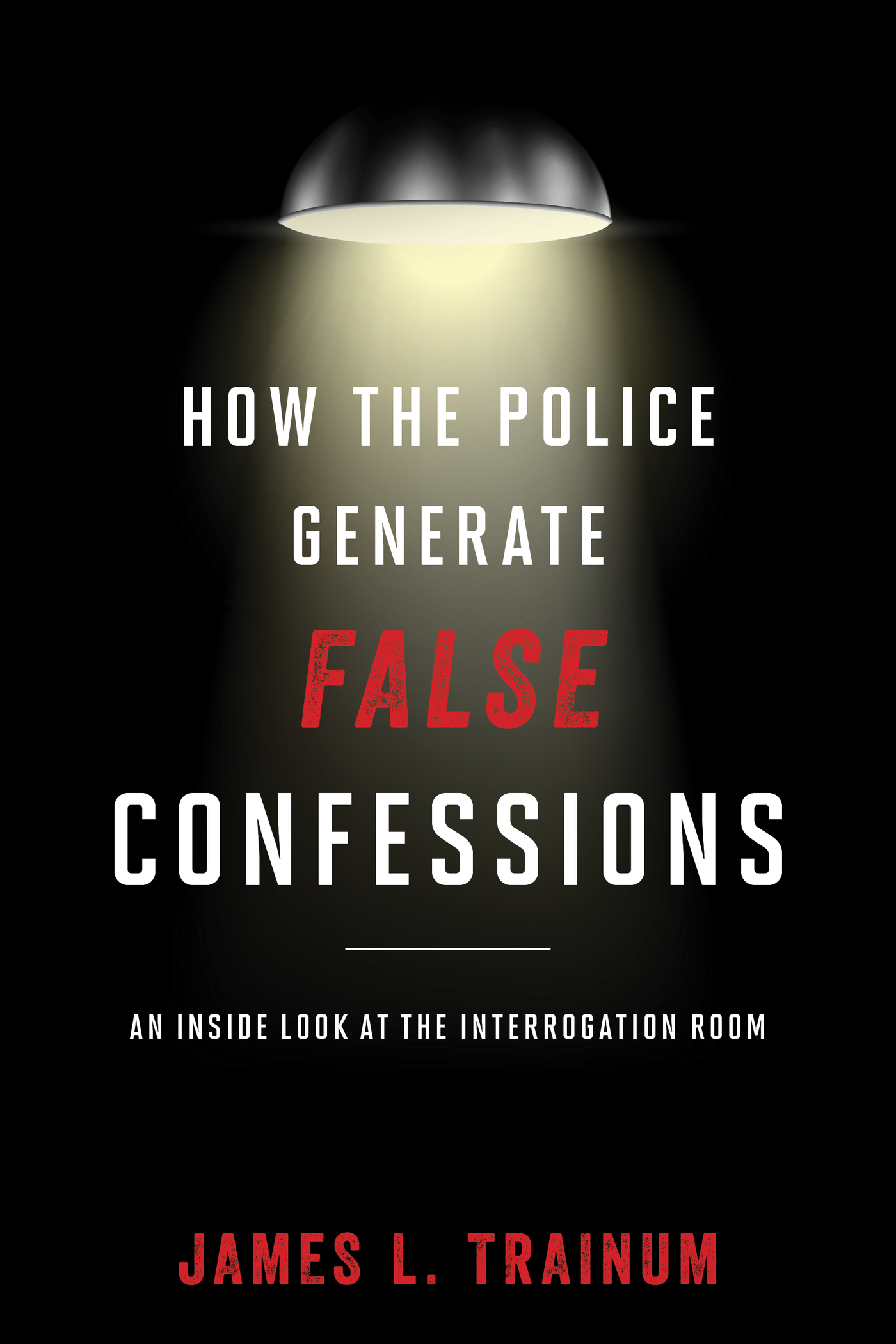How the Police Generate False Confessions
How the Police Generate False Confessions
An Inside Look at the
Interrogation Room
James L. Trainum
ROWMAN & LITTLEFIELD
Lanham Boulder New York London
Published by Rowman & Littlefield
A wholly owned subsidiary of The Rowman & Littlefield Publishing Group, Inc.
4501 Forbes Boulevard, Suite 200, Lanham, Maryland 20706
www.rowman.com
Unit A, Whitacre Mews, 26-34 Stannary Street, London SE11 4AB
Copyright 2016 by Rowman & Littlefield
All rights reserved. No part of this book may be reproduced in any form or by any electronic or mechanical means, including information storage and retrieval systems, without written permission from the publisher, except by a reviewer who may quote passages in a review.
British Library Cataloguing in Publication Information Available
Library of Congress Cataloging-in-Publication Data
Name: Trainum, James L.
Title: How the police generate false confessions : An inside look at the interrogation room / James L. Trainum.
Description: Lanham : Rowman & Littlefield, 2016. | Includes bibliographical references and index.
ISBN 9781442244641 (cloth : alk. paper) | ISBN 9781442244658 (electronic)
 TM The paper used in this publication meets the minimum requirements of American National Standard for Information Sciences Permanence of Paper for Printed Library Materials, ANSI/NISO Z39.48-1992.
TM The paper used in this publication meets the minimum requirements of American National Standard for Information Sciences Permanence of Paper for Printed Library Materials, ANSI/NISO Z39.48-1992.
Printed in the United States of America
Dedicated to the Norfolk Four, whose story I have used throughout this book and is, unfortunately, way too
common an occurrence in the criminal justice system.
Acknowledgments
Having been a cop for twenty-seven years, I know that some of my colleagues will look upon this book as a betrayal of the thin blue line. It isnt. Every day there are more and more stories coming to light about wrongful convictions, many of which are the result of false confessions obtained during police interrogations. To prevent false confessions and other types of false statement evidence, you first have to understand how they happen. That is what I have hoped to shed light upon, and more importantly, to identify solutions that would help eliminate the problem, leading to better police work and more criminals in jail, which is what we all want.
Little if any of the material presented here is mine alone. I have taken full advantage of decades of past research, as well as the ongoing work of those in academia and all fields of the criminal justice system. I wish to express my deepest appreciation to the many persons who have taken the time and energy to advise me not only regarding this book but also in my evolution regarding the topic. I hope that through this book I have done justice to their work. All of us have the same goal as even the most critical of my law enforcement colleaguesensuring that we get the right guy, but do it the right way.
I would especially like to thank Shawn Armbrust, Esq., Mid-Atlantic Innocence Project; Todd Barron, Royal Newfoundland Constabulary; Marissa Bluestone, Esq., Pennsylvania Innocence Project; Anita L. Boss, PsyD, Clinical & Forensic Consulting; Prof. Robert Cialdini, Arizona State University; Leah Colao, Marymount University Forensic Psychology student; Prof. Gary David, Bentley University; Gregory DeClue, PhD; Constance DeFranco, Marymount University; Ashley DeMarch, Marymount University Forensic Psychology student; Prof. Steve Drizin, Northwestern University School of Law; James Doyle, Esq., Bassil, Klovee & Budreau; Kelsey Foss, Marymount University Forensic Psychology student; Prof. Brandon Garrett, University of Virginia School of Law; Michael Garvey, director, Philadelphia Police Department, Office of Forensic Services; Andy Griffiths, PhD, IKAT Consulting; Honorable W. Louis Hennessy, District Court of Maryland; E. Desmond Hogan, Esq., Hogan, Lovells; John Holloway, Executive Director of the Quattrone Center for the Fair Administration of Justice; Pennsylvania Law School Prof. Saul Kassin, Williams College, Department of Psychology; George H. Kendall, Esq., Squire, Patton, Boggs; Mollie Kennedy, Marymount University Forensic Psychology student; Prof. Richard Leo, University of San Francisco School of Law; Sandra Levick, Esq., Public Defender Service for the District of Columbia; Prof. Mary Lindahl, Marymount University; Tom Lowenstein, Policy Director, Innocence Project New Orleans; Gregg McCrary, Behavioral Criminology International; Prof. Christian Meissner, Iowa State University, Department of Psychology; Peter Neufeld, Esq, Neufeld, Sheck & Brustin, LLP; Prof. Laura Nirider, Northwestern University School of Law; Marilyn B. Peterson, Marymount University Forensic Psychology student; Prof. Kim Rossmo, Texas State University; Donald P. Salzman, Esq., Skadden, Arps, Slate, Meagher & Flom, LLP; Barry Scheck, Esq., Neufeld, Scheck & Brustin, LLP; Jon Shapiro, Esq., Greenspun Shapiro, PC; Prof. Brent Snook, Memorial University in Newfoundland; and Deja Vishney, Esq., Wisconsin State Public Defenders.
I would like to thank the editors and staff at Rowman & Littlefield, whose edits and suggestions make me sound a lot smarter than I really am. And a special thanks to Associate Editor Kathryn Knigge. Not only did she propose the process, she offered encouragement and occasional hand holding.
Among many of the unnamed that I would like to thank are my critics and the attorneys who have subjected me to often brilliant cross-examination when testifying as an expert on interrogations and false confessions. Their arguments have helped me sharpen mine, or in some cases modify them.
And finally, thanks to my long-suffering wife, Diana Havlin. After warning me about how all consuming this project would be, she never once said I told you so as I rose very early, very often to try to meet deadlines. She did the initial edits for me, correcting my tenses and finishing my thoughts. I could not have done it without her.
Introduction
The day begins as always with the alarm going off at 6:00 am. Hit snooze twice, and avoid thinking about what will be facing you at work that Monday morning. No time for breakfast. Just some coffee in a travel mug and out the door.
But this Monday is a bit different. Two doors down, you see police cars in the driveway, police tape strung around the house. Something must have happened to the old man who lived there. You stand briefly on your front lawn, then walk over to speak to a neighbor standing on her front porch. What happened? you naturally ask. She is not sure. Just heard that the old mans daughter had not heard from him so she went over late last night to check on his welfare. Then the police came. Someone said there was a lot of blood.
Would not surprise me if somebody had enough of the old mans crap and offed him, you comment. The old man was the neighborhoods pain in the ass. Always complaining, threating to file lawsuits, leaving obnoxious letters under car windshield wipers. You had had your share of run-ins with him, the latest being just last week. The old guy came out of his house, screaming like a maniac, only because your dog pissed on the curb in front of his house. It had already been a bad day for you, so you screamed back. Caused a bit of a ruckus; some of the neighbors came out to watch, but you walked away after you had your say and thought nothing more of it.
The commute to work was no worse than usual. Nor was the day. Arriving home, you let out the dog in the back yard and popped open a beer. The police cars and tape were gone, and the neighborhood looked normal again. Then, there is a knock on your door.
Next page
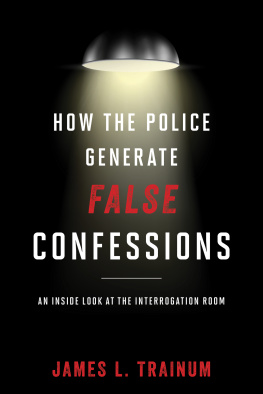


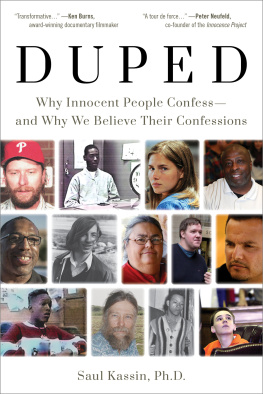
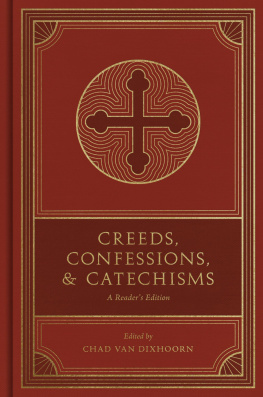


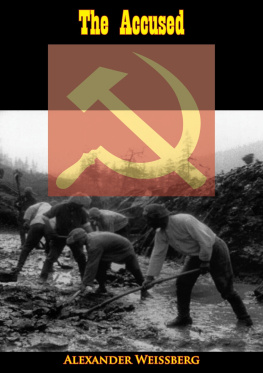


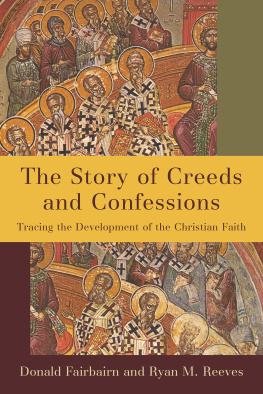

 TM The paper used in this publication meets the minimum requirements of American National Standard for Information Sciences Permanence of Paper for Printed Library Materials, ANSI/NISO Z39.48-1992.
TM The paper used in this publication meets the minimum requirements of American National Standard for Information Sciences Permanence of Paper for Printed Library Materials, ANSI/NISO Z39.48-1992.